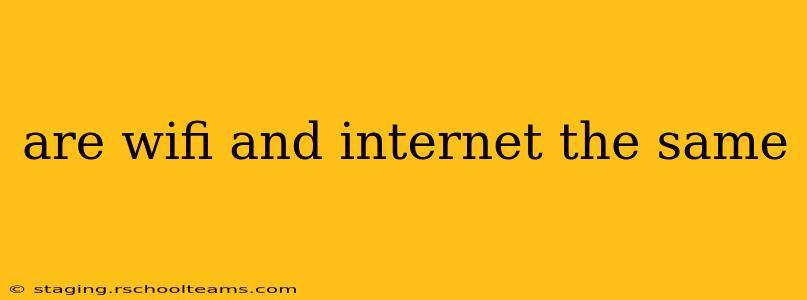The terms "WiFi" and "internet" are often used interchangeably, leading to confusion. While they're closely related, they are not the same thing. Think of it like this: the internet is the vast highway system, and WiFi is one of the many roads you can take to access it.
What is the Internet?
The internet is a global network of interconnected computer networks. It's a massive system that allows billions of devices worldwide to communicate and share information. This information exchange happens through a complex system of protocols and servers, enabling us to access websites, emails, videos, and much more. The internet itself isn't a physical thing; it's a concept representing the global connection of networks.
What is WiFi?
WiFi, or Wireless Fidelity, is a wireless networking technology that uses radio waves to provide internet access. It allows devices like laptops, smartphones, and tablets to connect to a network without the need for physical cables. Essentially, WiFi is a local area network (LAN) technology that enables devices to connect to a router, which in turn provides access to the internet (if the router is connected to the internet).
H2: How do WiFi and the Internet work together?
Your WiFi router acts as the bridge between your local network and the broader internet. When you connect to your WiFi network, your device is connected to the router. If the router is connected to an internet service provider (ISP), like Comcast, Verizon, or AT&T, then your device can then access the vast resources of the internet through that connection. Without this connection to an ISP, your WiFi network would be isolated; you'd have a local network but no internet access.
H2: Can I have WiFi without the internet?
Yes, absolutely. You can set up a WiFi network without connecting it to the internet. This is often done in situations where devices need to communicate locally, such as sharing files within a home or office. In this scenario, you'd have a WiFi network, but you wouldn't be able to browse the web, check email, or access online services.
H2: What are some common misconceptions about WiFi and the internet?
A common misconception is that WiFi is the internet. It's a common mistake, because WiFi is how many of us access the internet daily. However, WiFi is merely a means of connecting to it. Another misconception is that you need WiFi to access the internet. While WiFi is incredibly convenient, you can access the internet through other means, such as Ethernet cables, cellular data (4G, 5G), or satellite internet.
H2: What's the difference between a router and a modem?
While often used together, a router and a modem are distinct devices. A modem connects your home network to your internet service provider (ISP). It translates the signals your ISP uses into data your devices can understand. A router takes the internet connection from the modem and creates a local network, allowing multiple devices to share that connection. Many devices combine both modem and router functionality into one unit.
In short, the internet is the vast network, and WiFi is a wireless way to access it. They are distinct but inseparable components of our modern digital world. Understanding the difference is crucial to troubleshooting connectivity issues and appreciating the architecture of the global network that connects us all.
